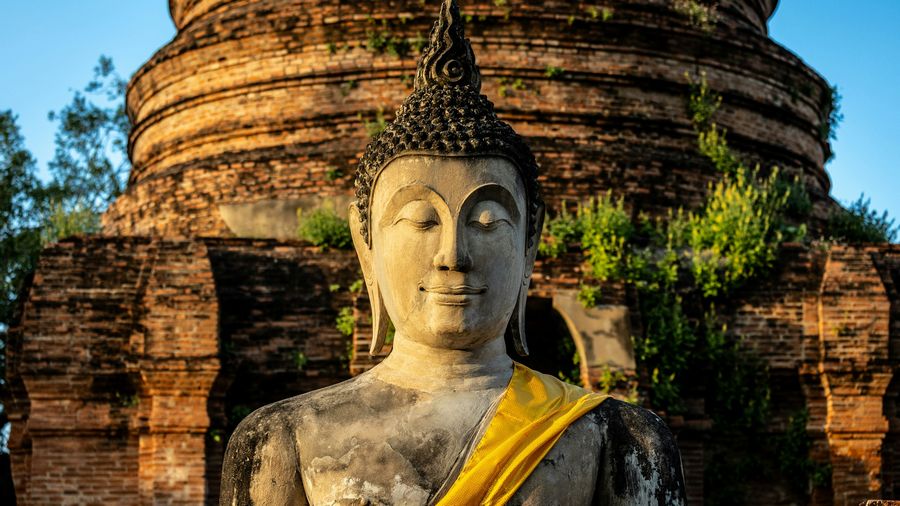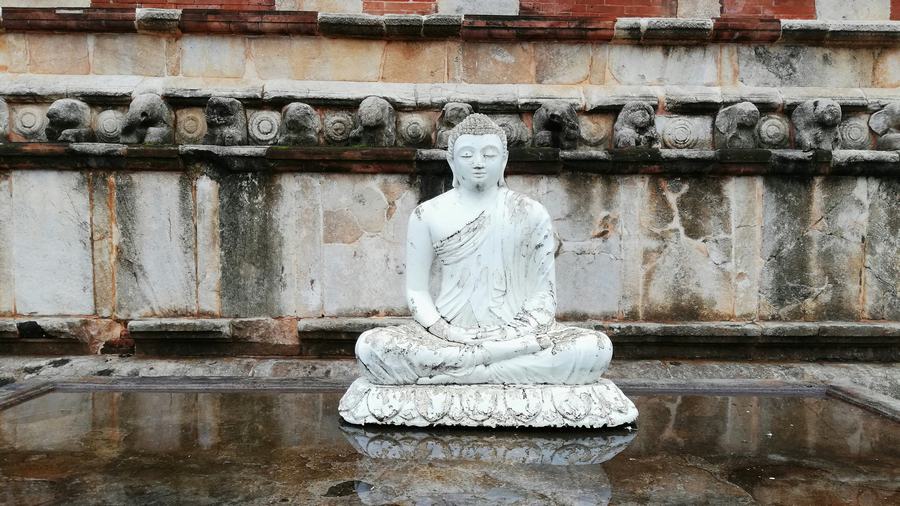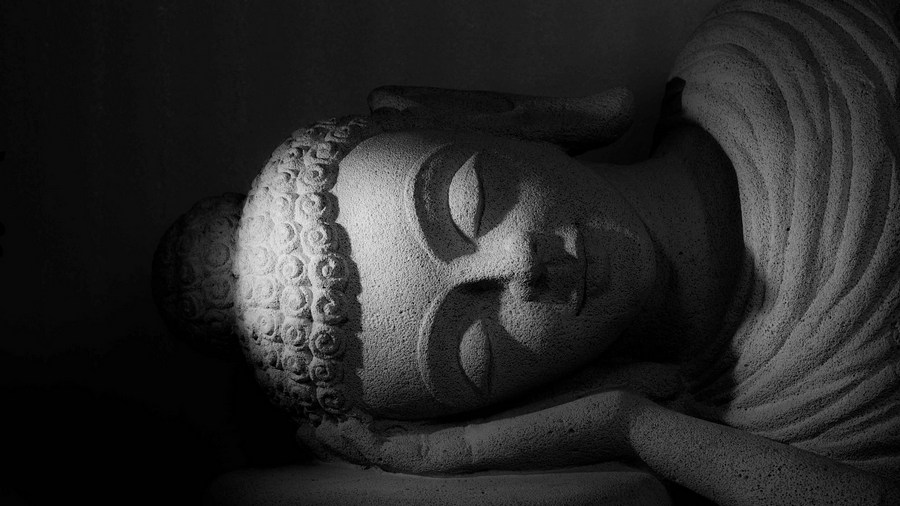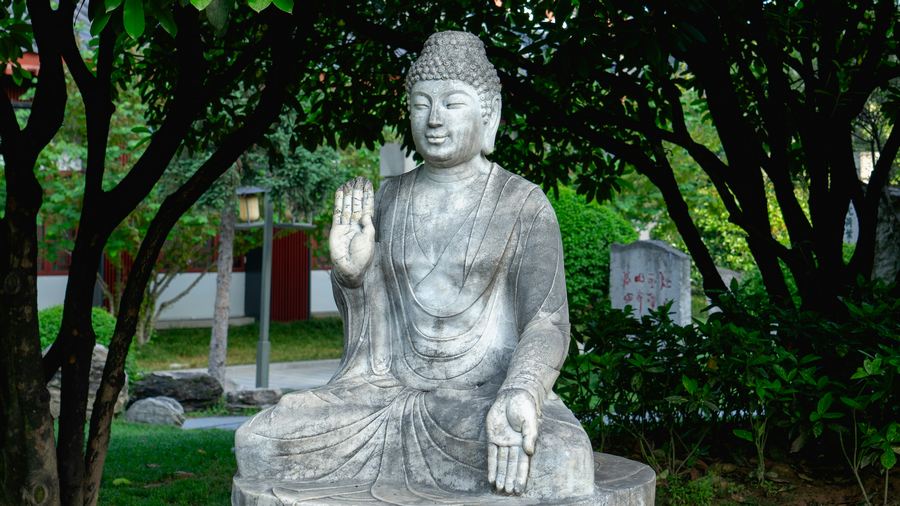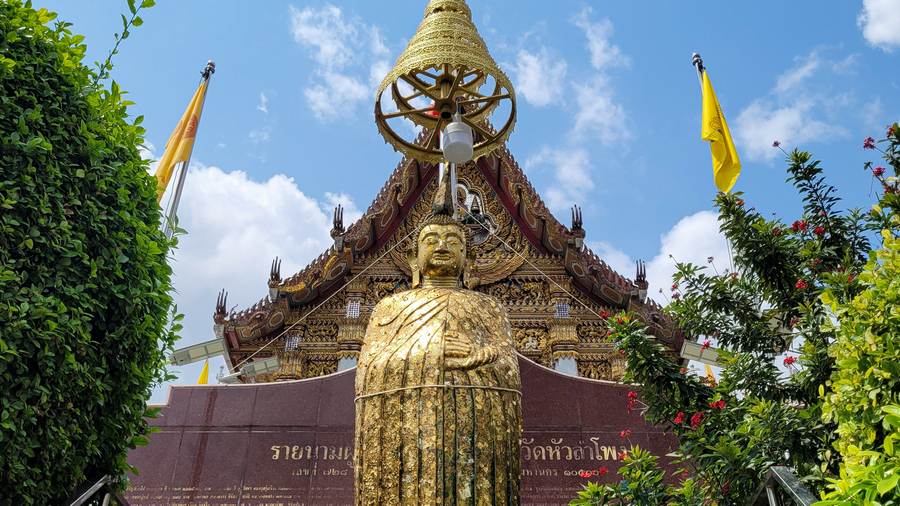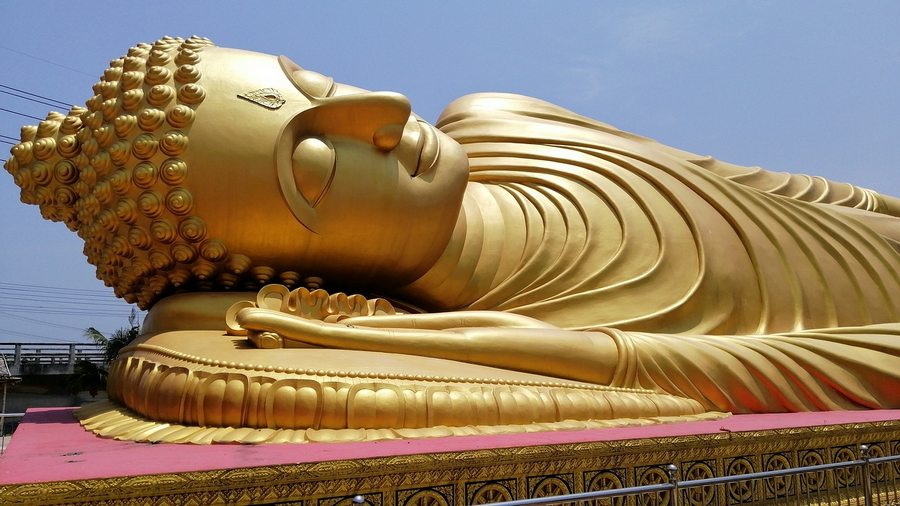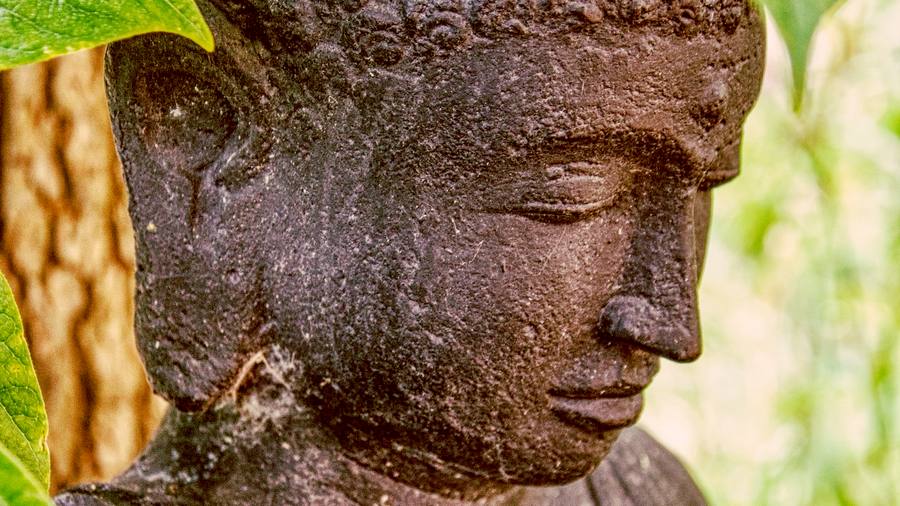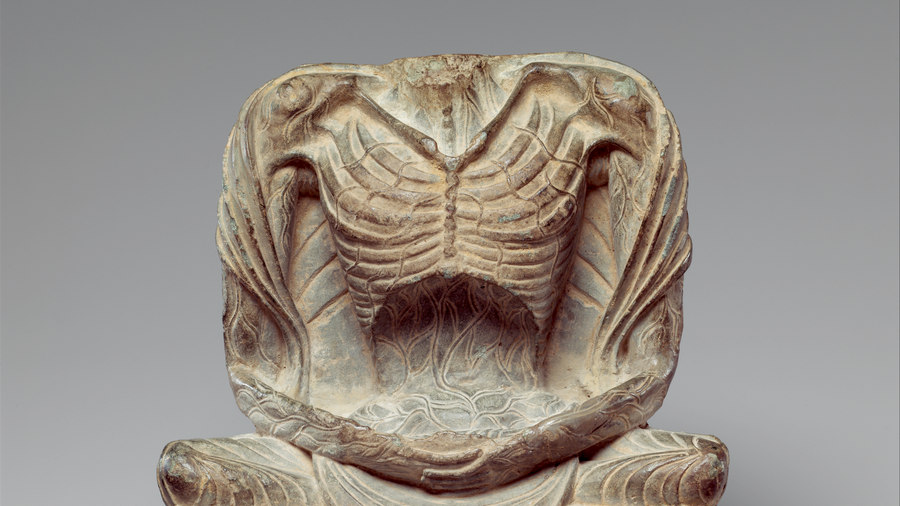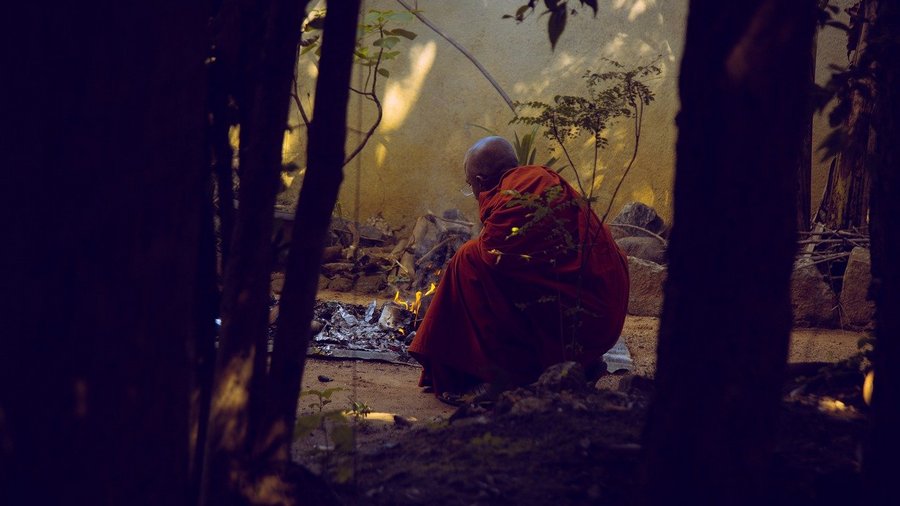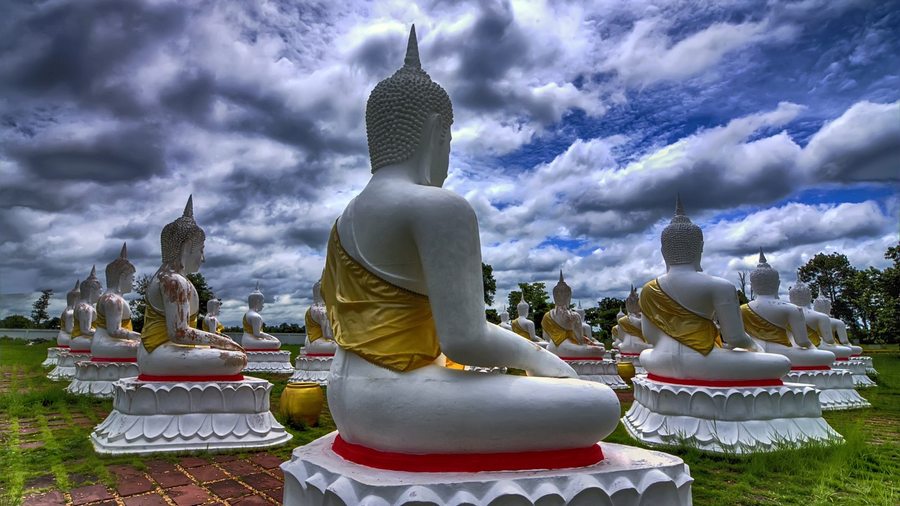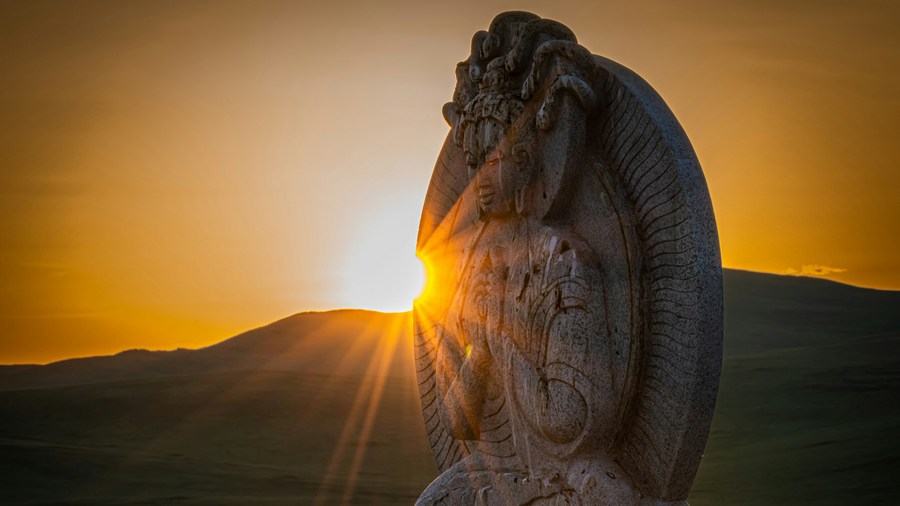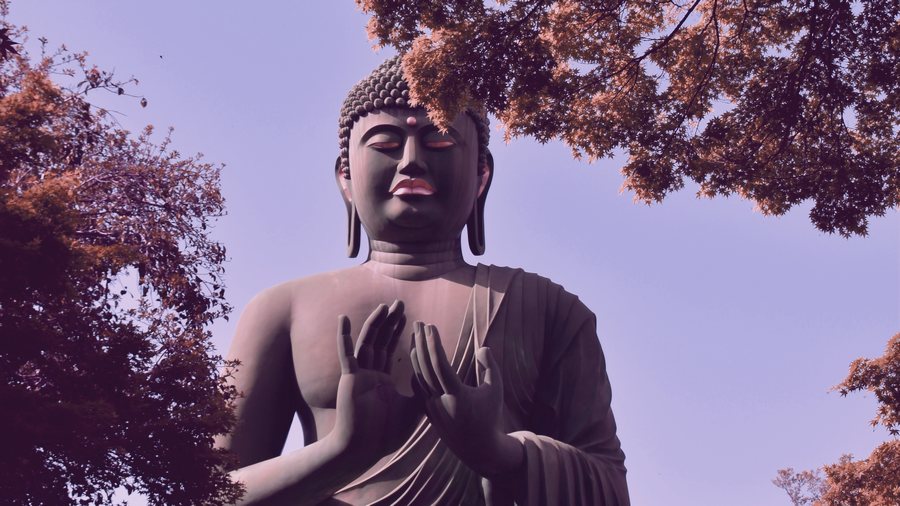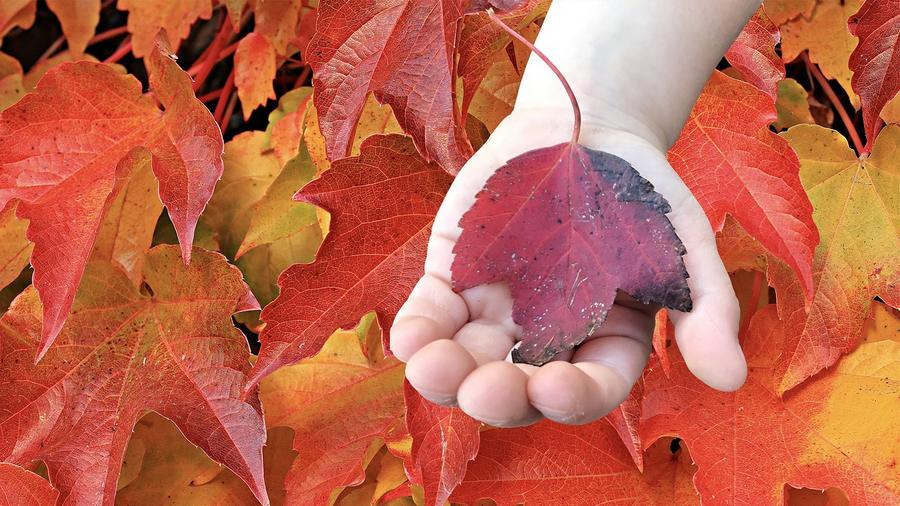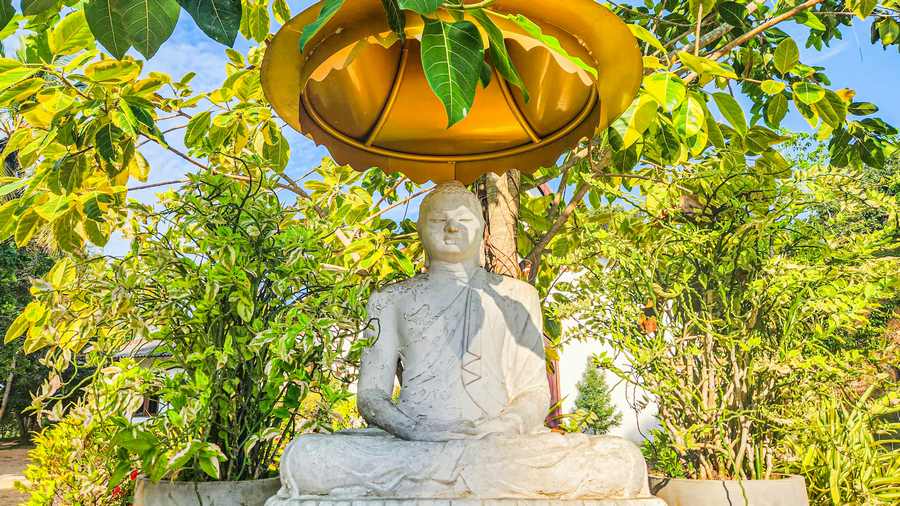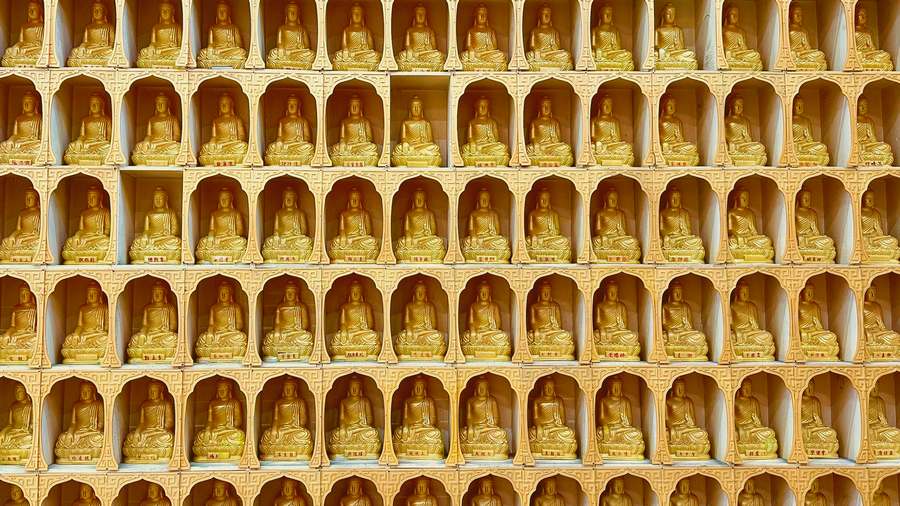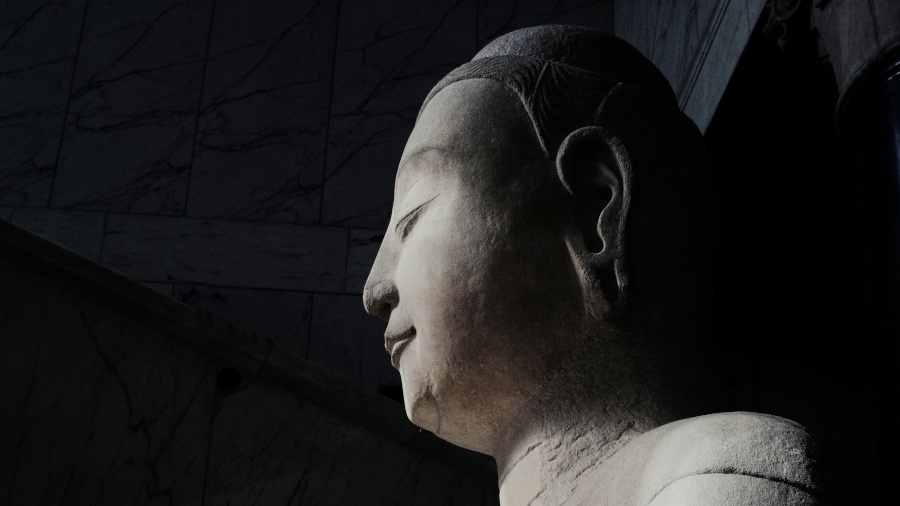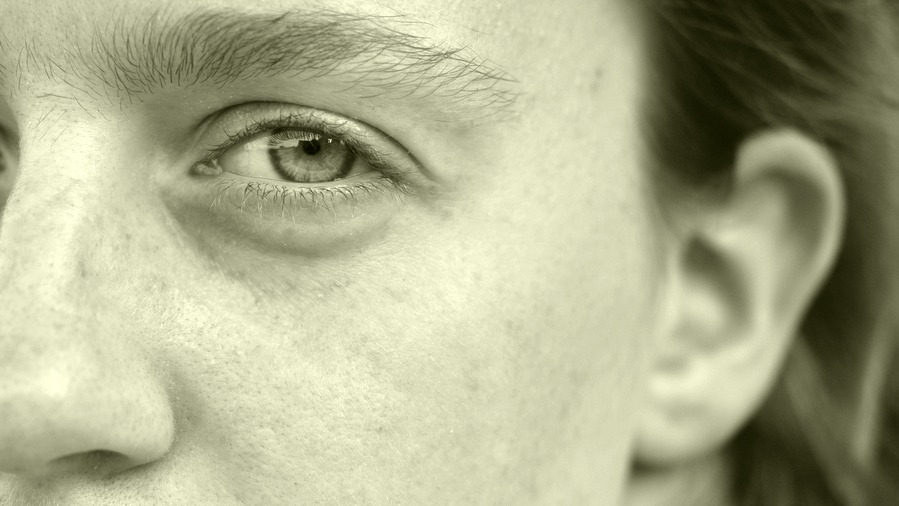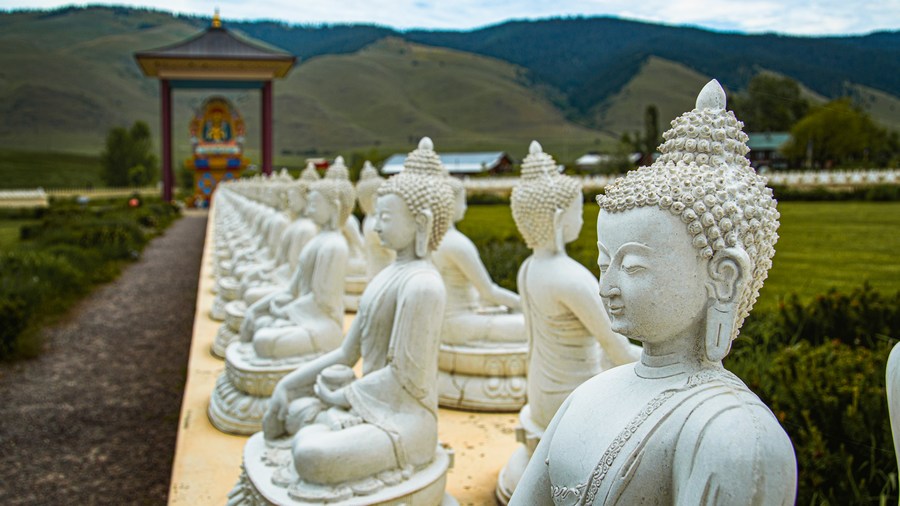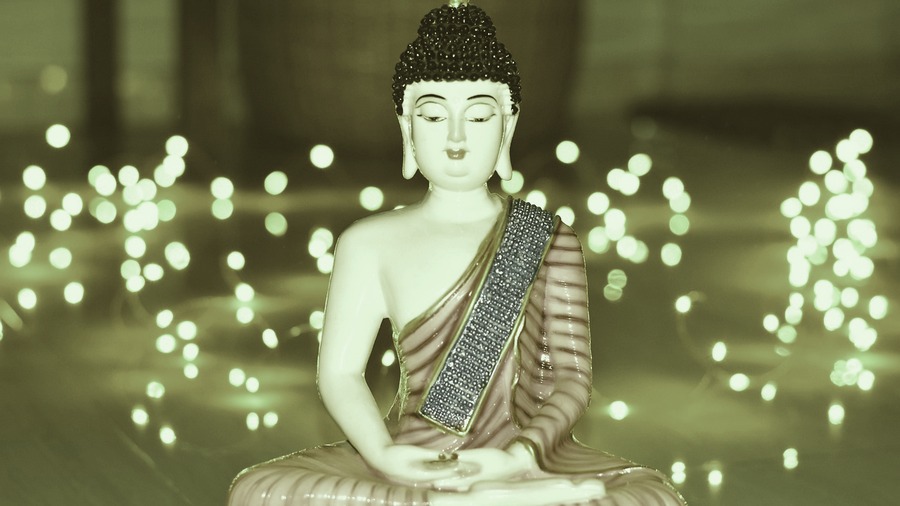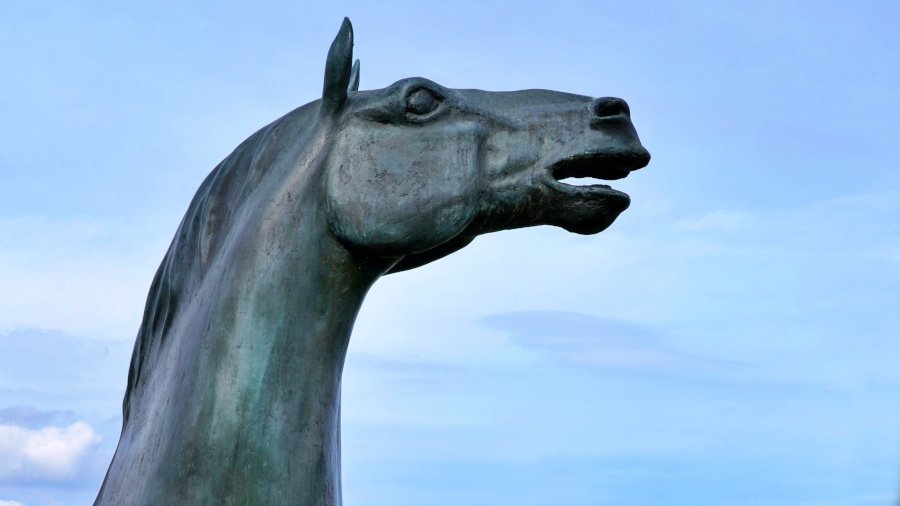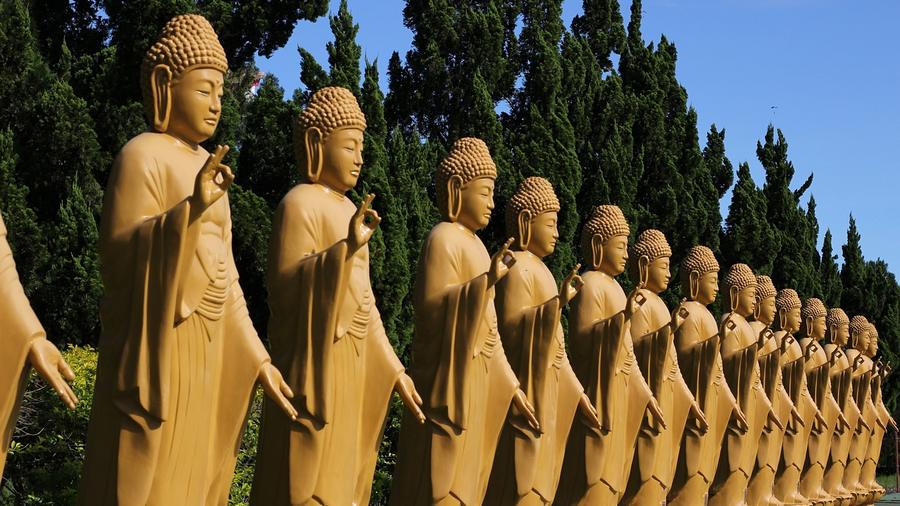[Note: Some of the weekend selections this month will be much longer than usual so that we can learn more about the Buddha and his path to enlightenment. In this sutta the Buddha talks about his own experience with meditation before his enlightenment. There is a lot of repetition, so if you are short of time skimming is better than not reading at all.]
I have heard that on one occasion the Blessed One was staying among the Mallans near a Mallan town named Uruvelakappa. Then early in the morning the Blessed One—having adjusted his lower robe and carrying his bowl & outer robe—went into Uruvelakappa for alms. Having gone into Uruvelakappa for alms, after his meal, on his return from his alms round, he said to Ven. Ānanda, “Stay right here, Ānanda, while I go into the Great Forest for the day’s abiding.”
“As you say, lord,” Ven. Ānanda responded to him.
Then the Blessed One went into the Great Forest and sat down at the root of a certain tree for the day’s abiding.
Then Tapussa the householder went to Ven. Ānanda and, on arrival, having bowed down to him, sat to one side. As he was sitting there he said to Ven. Ānanda: “Venerable Ānanda, sir, we are householders who indulge in sensuality, delight in sensuality, enjoy sensuality, rejoice in sensuality. For us—indulging in sensuality, delighting in sensuality, enjoying sensuality, rejoicing in sensuality—renunciation seems like a sheer drop-off. Yet I’ve heard that in this Dhamma & Vinaya the hearts of the very young monks leap up at renunciation, grow confident, steadfast, & released, seeing it as peace. So right here is where this Dhamma & Vinaya is contrary to the great mass of people: i.e., (this issue of) renunciation.”
“This calls for a talk, householder. Let’s go see the Blessed One. Let’s approach him and, on arrival, tell him this matter. However he explains it to us, we will bear it in mind.”
“As you say, sir,” Tapussa the householder responded to Ven. Ānanda.
Then Ven. Ānanda, together with Tapussa the householder, went to the Blessed One and, on arrival, having bowed down to him, sat to one side. As he was sitting there Ven. Ānanda said to the Blessed One: “Tapussa the householder, here, has said to me, ‘Venerable Ānanda, sir, we are householders who indulge in sensuality, delight in sensuality, enjoy sensuality, rejoice in sensuality. For us—indulging in sensuality, delighting in sensuality, enjoying sensuality, rejoicing in sensuality—renunciation seems like a sheer drop-off. Yet I’ve heard that in this Dhamma & Vinaya the hearts of the very young monks leap up at renunciation, grow confident, steadfast, & released, seeing it as peace. So right here is where this Dhamma & Vinaya is contrary to the great mass of people: i.e., (this issue of) renunciation.’”
“So it is, Ānanda. So it is. Even I myself, before my self-awakening, when I was still an unawakened bodhisatta, thought: ‘Renunciation is good. Seclusion is good.’ But my heart didn’t leap up at renunciation, didn’t grow confident, steadfast, or released, seeing it as peace. The thought occurred to me: ‘What is the cause, what is the reason, why my heart doesn’t leap up at renunciation, doesn’t grow confident, steadfast, or released, seeing it as peace?’ Then the thought occurred to me: ‘I haven’t seen the drawback of sensual pleasures; I haven’t pursued (that theme). I haven’t understood the reward of renunciation; I haven’t familiarized myself with it. That’s why my heart doesn’t leap up at renunciation, doesn’t grow confident, steadfast, or released, seeing it as peace.’
[1] “Then the thought occurred to me: ‘If, having seen the drawback of sensual pleasures, I were to pursue that theme; and if, having understood the reward of renunciation, I were to familiarize myself with it, there’s the possibility that my heart would leap up at renunciation, grow confident, steadfast, & released, seeing it as peace.’
“So at a later time, having seen the drawback of sensual pleasures, I pursued that theme; having understood the reward of renunciation, I familiarized myself with it. My heart leaped up at renunciation, grew confident, steadfast, & released, seeing it as peace. Then, quite secluded from sensuality, secluded from unskillful qualities, I entered & remained in the first jhāna: rapture & pleasure born of seclusion, accompanied by directed thought & evaluation.
“As I remained there, I was beset with attention to perceptions dealing with sensuality. That was an affliction for me. Just as pain arises as an affliction for a healthy person, even so the attention to perceptions dealing with sensuality that beset me was an affliction for me.
[2] “The thought occurred to me: ‘What if, with the stilling of directed thoughts & evaluations, I were to enter & remain in the second jhāna: rapture & pleasure born of concentration, unification of awareness free from directed thought & evaluation—internal assurance.’ But my heart didn’t leap up at being without directed thought, didn’t grow confident, steadfast, or released, seeing it as peace. The thought occurred to me: ‘What is the cause, what is the reason, why my heart doesn’t leap up at being without directed thought, doesn’t grow confident, steadfast, or released, seeing it as peace?’ Then the thought occurred to me: ‘I haven’t seen the drawback of directed thought; I haven’t pursued that theme. I haven’t understood the reward of being without directed thought; I haven’t familiarized myself with it. That’s why my heart doesn’t leap up at being without directed thought, doesn’t grow confident, steadfast, or released, seeing it as peace.’
“Then the thought occurred to me: ‘If, having seen the drawback of directed thought, I were to pursue that theme; and if, having understood the reward of being without directed thought, I were to familiarize myself with it, there’s the possibility that my heart would leap up at being without directed thought, grow confident, steadfast, & released, seeing it as peace.’
“So at a later time, having seen the drawback of directed thought, I pursued that theme; having understood the reward of being without directed thought, I familiarized myself with it. My heart leaped up at being without directed thought, grew confident, steadfast, & released, seeing it as peace. With the stilling of directed thoughts & evaluations, I entered & remained in the second jhāna: rapture & pleasure born of concentration, unification of awareness free from directed thought & evaluation—internal assurance.
“As I remained there, I was beset with attention to perceptions dealing with directed thought. That was an affliction for me. Just as pain arises as an affliction for a healthy person, even so the attention to perceptions dealing with directed thought that beset me was an affliction for me.
[3] “The thought occurred to me: ‘What if, with the fading of rapture, I were to remain equanimous, mindful, & alert, to sense pleasure with the body, and to enter & remain in the third jhāna, of which the noble ones declare, “Equanimous & mindful, he has a pleasant abiding”?’ But my heart didn’t leap up at being without rapture, didn’t grow confident, steadfast, or released, seeing it as peace.… So at a later time, having seen the drawback of rapture, I pursued that theme; having understood the reward of being without rapture, I familiarized myself with it. My heart leaped up at being without rapture, grew confident, steadfast, & released, seeing it as peace. With the fading of rapture, I remained equanimous, mindful, & alert, sensed pleasure with the body, and entered & remained in the third jhāna, of which the noble ones declare, ‘Equanimous & mindful, he has a pleasant abiding.’
“As I remained there, I was beset with attention to perceptions dealing with rapture. That was an affliction for me. Just as pain arises as an affliction for a healthy person, even so the attention to perceptions dealing with rapture that beset me was an affliction for me.
[4] “The thought occurred to me: ‘What if, with the abandoning of pleasure & pain—as with the earlier disappearance of elation & distress—I were to enter & remain in the fourth jhāna: purity of equanimity & mindfulness, neither-pleasure-nor-pain?’ But my heart didn’t leap up at being without the pleasure of equanimity, didn’t grow confident, steadfast, or released, seeing it as peace.… So at a later time, having seen the drawback of the pleasure of equanimity, I pursued that theme; having understood the reward of neither-pleasure-nor-pain, I familiarized myself with it. My heart leaped up at neither-pleasure-nor-pain, grew confident, steadfast, & released, seeing it as peace. With the abandoning of pleasure & pain—as with the earlier disappearance of elation & distress—I entered & remained in the fourth jhāna: purity of equanimity & mindfulness, neither-pleasure-nor-pain.
“As I remained there, I was beset with attention to perceptions dealing with equanimity. That was an affliction for me. Just as pain arises as an affliction for a healthy person, even so the attention to perceptions dealing with equanimity that beset me was an affliction for me.
[5] “The thought occurred to me: ‘What if, with the complete transcending of perceptions of form, with the disappearance of perceptions of resistance, and not attending to perceptions of multiplicity, (perceiving,) “Infinite space,” I were to enter & remain in the dimension of the infinitude of space?’ But my heart didn’t leap up at the dimension of the infinitude of space, didn’t grow confident, steadfast, or released, seeing it as peace.… So at a later time, having seen the drawback of forms, I pursued that theme; having understood the reward of the dimension of the infinitude of space, I familiarized myself with it. My heart leaped up at the dimension of the infinitude of space, grew confident, steadfast, & released, seeing it as peace. With the complete transcending of perceptions of (physical) form, with the disappearance of perceptions of resistance, and not attending to perceptions of multiplicity, (perceiving,) ‘Infinite space,’ I entered & remained in the dimension of the infinitude of space.
“As I remained there, I was beset with attention to perceptions dealing with forms. That was an affliction for me. Just as pain arises as an affliction for a healthy person, even so the attention to perceptions dealing with forms that beset me was an affliction for me.
[6] “The thought occurred to me: ‘What if, with the complete transcending of the dimension of the infinitude of space, (perceiving,) “Infinite consciousness,” I were to enter & remain in the dimension of the infinitude of consciousness?’ But my heart didn’t leap up at the dimension of the infinitude of consciousness, didn’t grow confident, steadfast, or released, seeing it as peace.… So at a later time, having seen the drawback of the dimension of the infinitude of space, I pursued that theme; having understood the reward of the dimension of the infinitude of consciousness, I familiarized myself with it. My heart leaped up at the dimension of the infinitude of consciousness, grew confident, steadfast, & released, seeing it as peace. With the complete transcending of the dimension of the infinitude of space, (perceiving,) ‘Infinite consciousness,’ I entered & remained in the dimension of the infinitude of consciousness.
“As I remained there, I was beset with attention to perceptions dealing with the dimension of the infinitude of space. That was an affliction for me. Just as pain arises as an affliction for a healthy person, even so the attention to perceptions dealing with the dimension of the infinitude of space that beset me was an affliction for me.
[7] “The thought occurred to me: ‘What if, with the complete transcending of the dimension of the infinitude of consciousness, (perceiving,) “There is nothing,” I were to enter & remain in the dimension of nothingness?’ But my heart didn’t leap up at the dimension of nothingness, didn’t grow confident, steadfast, or released, seeing it as peace.… So at a later time, having seen the drawback of the dimension of the infinitude of consciousness, I pursued that theme; having understood the reward of the dimension of nothingness, I familiarized myself with it. My heart leaped up at the dimension of nothingness, grew confident, steadfast, & released, seeing it as peace. With the complete transcending of the dimension of the infinitude of consciousness, (perceiving,) ‘There is nothing,’ I entered & remained in the dimension of nothingness.
“As I remained there, I was beset with attention to perceptions dealing with the dimension of the infinitude of consciousness. That was an affliction for me. Just as pain arises as an affliction for a healthy person, even so the attention to perceptions dealing with the dimension of the infinitude of consciousness that beset me was an affliction for me.
[8] “The thought occurred to me: ‘What if I, with the complete transcending of the dimension of nothingness, were to enter & remain in the dimension of neither perception nor non-perception?’ But my heart didn’t leap up at the dimension of neither perception nor non-perception, didn’t grow confident, steadfast, or released, seeing it as peace.… So at a later time, having seen the drawback of the dimension of nothingness, I pursued that theme; having understood the reward of the dimension of neither perception nor non-perception, I familiarized myself with it. My heart leaped up at the dimension of neither perception nor non-perception, grew confident, steadfast, & released, seeing it as peace. With the complete transcending of the dimension of nothingness, I entered & remained in the dimension of neither perception nor non-perception.
“As I remained there, I was beset with attention to perceptions dealing with the dimension of nothingness. That was an affliction for me. Just as pain arises as an affliction for a healthy person, even so the attention to perceptions dealing with the dimension of nothingness that beset me was an affliction for me.
[9] “The thought occurred to me: ‘What if I, with the complete transcending of the dimension of neither perception nor non-perception, were to enter & remain in the cessation of perception & feeling?’ But my heart didn’t leap up at the cessation of perception & feeling, didn’t grow confident, steadfast, or released, seeing it as peace. The thought occurred to me: ‘What is the cause, what is the reason, why my heart doesn’t leap up at the cessation of perception & feeling, doesn’t grow confident, steadfast, or released, seeing it as peace?’ Then the thought occurred to me: ‘I haven’t seen the drawback of the dimension of neither perception nor non-perception; I haven’t pursued that theme. I haven’t understood the reward of the cessation of perception & feeling; I haven’t familiarized myself with it. That’s why my heart doesn’t leap up at the cessation of perception & feeling, doesn’t grow confident, steadfast, or released, seeing it as peace.’
“Then the thought occurred to me: ‘If, having seen the drawback of the dimension of neither perception nor non-perception, I were to pursue that theme; and if, having understood the reward of the cessation of perception & feeling, I were to familiarize myself with it, there’s the possibility that my heart would leap up at the cessation of perception & feeling, grow confident, steadfast, & released, seeing it as peace.’
“So at a later time, having seen the drawback of the dimension of neither perception nor non-perception, I pursued that theme; having understood the reward of the cessation of perception & feeling, I familiarized myself with it. My heart leaped up at the cessation of perception & feeling, grew confident, steadfast, & released, seeing it as peace. With the complete transcending of the dimension of neither perception nor non-perception, I entered & remained in the cessation of perception & feeling. And as I saw (that) with discernment, effluents were completely ended.
“Ānanda, as long as I had not attained & emerged from these nine step-by-step dwelling-attainments in forward & backward order in this way, I did not claim to have directly awakened to the right self-awakening unexcelled in the cosmos with its devas, Māras, & Brahmās, in this generation with its contemplatives & brahmans, its royalty & commonfolk. But as soon as I had attained & emerged from these nine step-by-step dwelling-attainments in forward & backward order in this way, then I did claim to have directly awakened to the right self-awakening unexcelled in the cosmos with its devas, Māras, & Brahmās, in this generation with its contemplatives & brahmans, its royalty & commonfolk. Knowledge & vision arose in me: ‘Unprovoked is my release. This is the last birth. There is now no further becoming.’”
Read this translation of Aṅguttara Nikāya 9.41 Tapussa Sutta. To Tapussa (On Renunciation) by Bhikkhu Ṭhanissaro on DhammaTalks.org. Or read a different translation on SuttaCentral.net. Or listen on SC-Voice.net. Or explore the Pali on DigitalPaliReader.online.
Or read a translation in Deutsch, বাংলা, Español, Bahasa Indonesia, Italiano, 日本語, မြန်မာဘာသာ, Português, Русский, සිංහල, ไทย, Tiếng Việt, or 汉语. Learn how to find your language.


